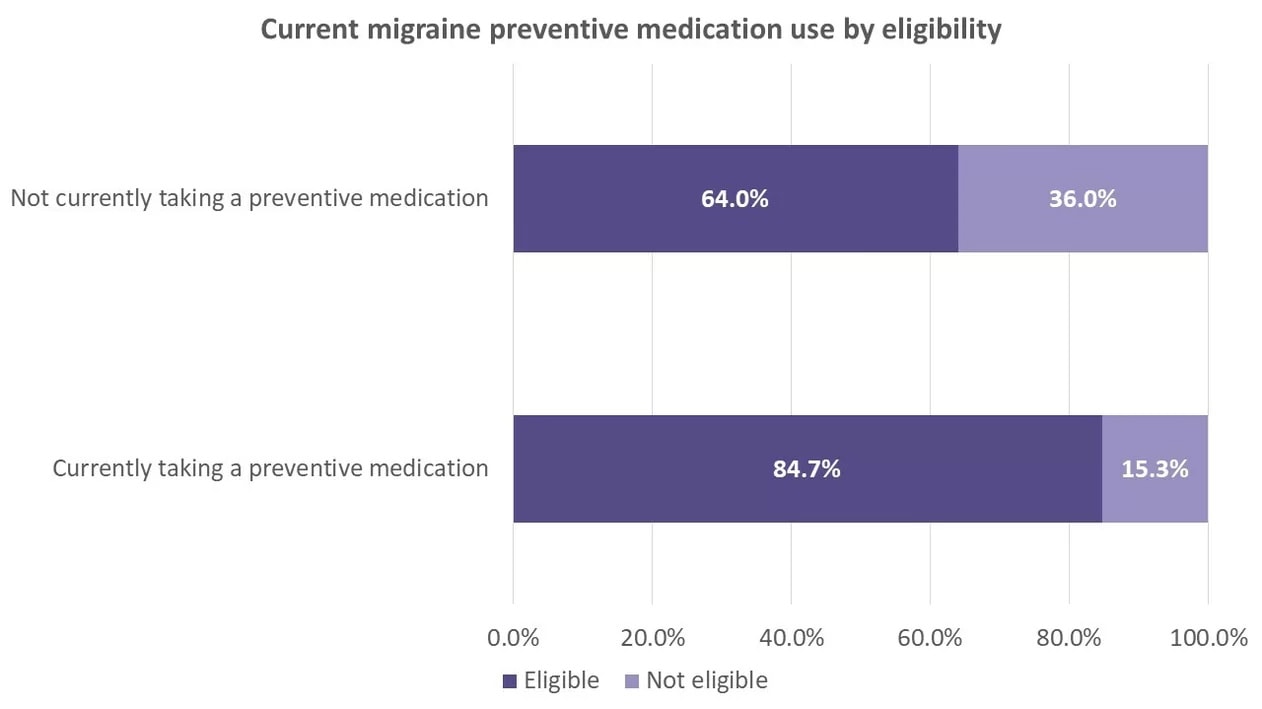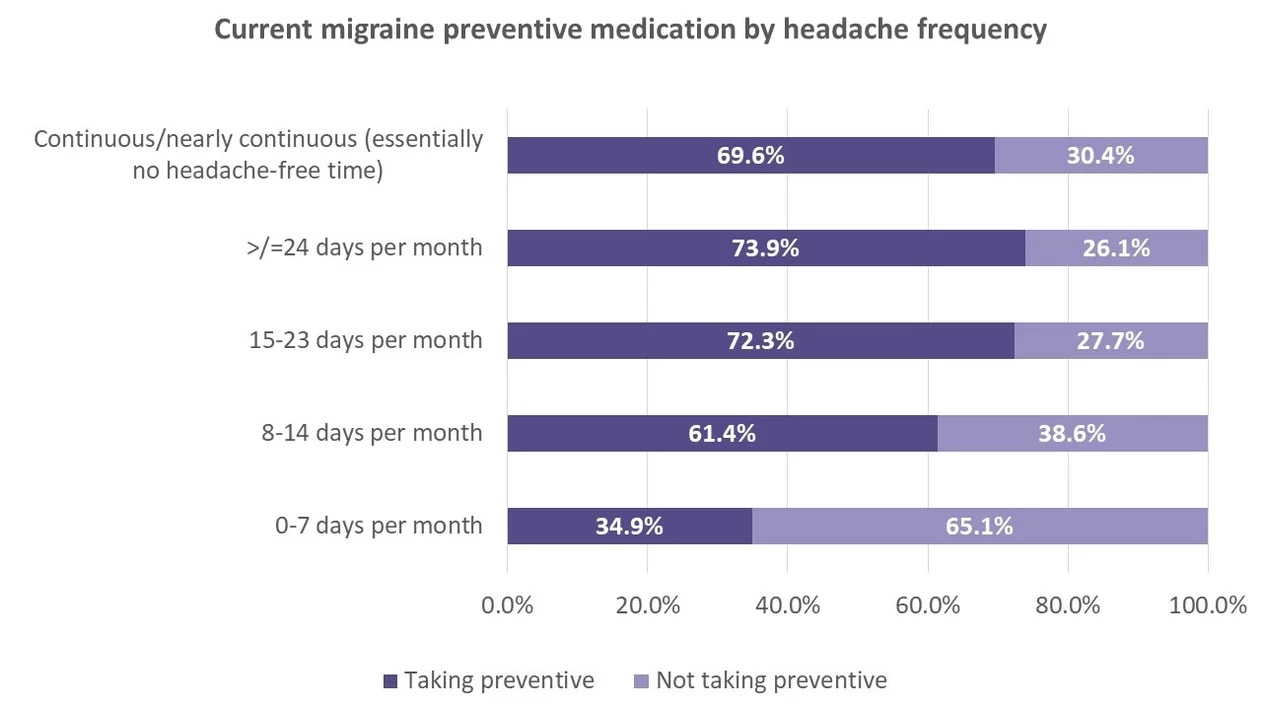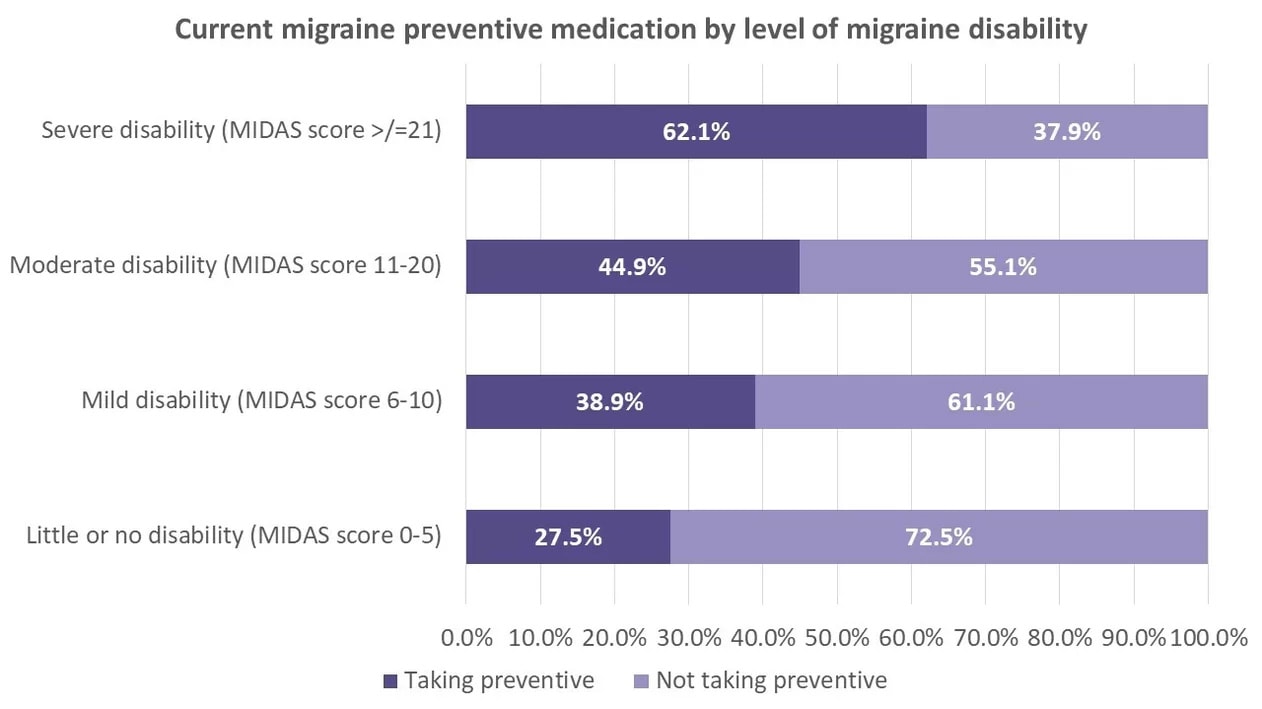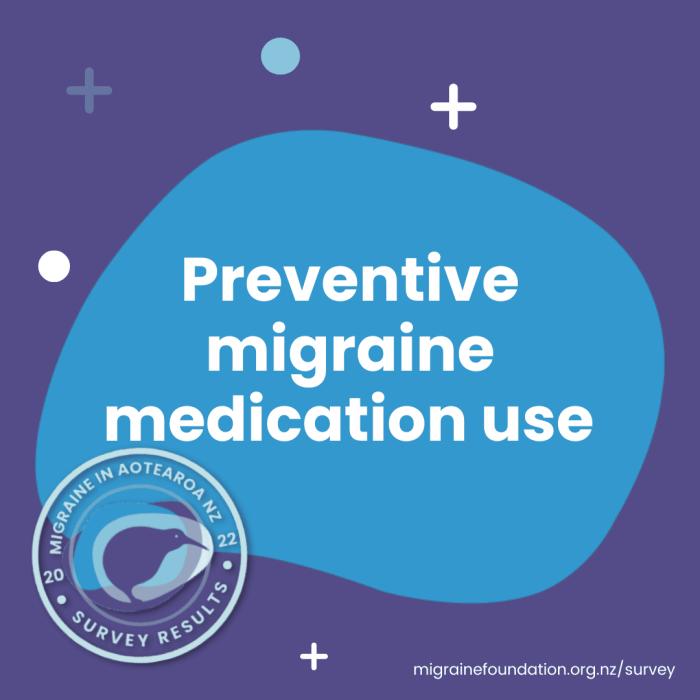Results from the Migraine in Aotearoa New Zealand Survey 2022
Preventive medication is recommended for people with migraine who get frequent or severe attacks.¹ Preventive medication is taken regularly (e.g. a daily oral tablet or a monthly injection) to try and stop attacks from coming on and dampen down the intensity or duration of attacks.
However, international research has found that preventive medication for migraine is under-used.² For example, a large US study of people with migraine calculated that 40.4% were eligible for preventive treatment but only 16.8% were currently using preventive medication.³
Preventive medications are used not only to reduce the pain and disability from frequent, severe migraine attacks but to try and avoid the progression of episodic migraine (headache on 14 days or less a month) to chronic migraine (headache on 15 days or more a month) and to manage medication adaptation headache (a chronic headache that can develop in response to high use of acute medications over three months or more). So there‘s a lot at stake for people who are eligible for preventive treatment but don’t get it, for whatever reason.
We wanted to know about the use of preventive medications in Aotearoa New Zealand, and whether people with migraine were receiving appropriate preventive treatment. From the 2022 Migraine in Aotearoa New Zealand (MiANZ) Survey, we determined respondents were eligible for preventive treatment if they had:
- Eight or more headache days a month; and/or
- Moderate to severe disability, as measured by the Migraine Disability Assessment Scale (MIDAS), which measures the impact of migraine attacks on daily life.⁴
This was based on the data we collected and gave us a conservative estimate of the number of people eligible for preventive treatment. The estimate is conservative because prevention can also be appropriate for people with fewer than eight headache days a month, for example, if the disability is high, if acute medications are ineffective or not well tolerated, or for specific types of migraine, including hemiplegic migraine, migraine with brainstem aura. We didn’t ask about all this in as much detail, since we had so many questions and didn’t want our respondents to get overloaded and give up, or trigger a migraine attack! So our results are likely to be an underestimate of the true number of people eligible for preventive medication.
Having said that, we found that nearly three-quarters (74%, n=393) of survey respondents were eligible for preventive medication, confirming that a high proportion of respondents had frequent and disabling migraine attacks. We then looked at the number of people who were currently using any prescribed preventive medication for migraine, including antidepressants, antiepileptics, antihypertensives, sandomigran, calcitonin gene-related peptide (CGRP) monoclonal antibodies, Botoxᵀᴹ and melatonin. Half of the survey respondents (n=249) were currently taking preventive medication and the other half (n=247) were not.
When we looked at current preventive medication use by eligibility for preventives, we found for those currently taking preventives, the majority (85%) would be considered eligible for preventive treatment, according to our criteria of headache frequency and disability. Of concern, nearly two-thirds (64%) of those not currently taking a preventive would be eligible for one. This indicates something amiss. A large number (n=158) of people with severe and frequent migraine attacks were not getting appropriate preventive treatment.

To look at this another way, we can calculate how many people are currently taking preventive medication based on the frequency of headaches and level of disability separately. For people with chronic migraine (15 or more headache days a month), 28-30% were not taking preventive medication. These are the people who most need a reduction in headache burden and are most likely to benefit from preventive treatment.

Similarly, 38% of people with severe disabilities and over half (55%) of those with moderate levels of disability from migraine were not taking preventive treatment.

There are many reasons people with migraine might not be taking preventive medication even if they’re eligible for this treatment. Many of the traditional oral preventive medications have objectionable side effects that are difficult to tolerate. The preventives don’t work for everyone and don’t work at all for some people. One study found only 17-20% of people continued with a preventive at 12 months.⁵ People stop treatment because it isn’t effective enough or it’s too hard to take. The fact that many of our survey respondents were on preventive medication and yet still had a high frequency of headaches and disability suggests these medications aren’t working well for many people.
There’s also the problem of health professionals not offering or prescribing preventive medication where it’s appropriate or not telling the patient how to take it properly (e.g. titrate the dose up slowly, continue for at least three months to see whether it will be effective, use more than one preventive if needed and combine with healthy lifestyle measures).
As well as people being under-treated with preventives, there’s the opposite problem of over-treatment, which is an issue of health professionals not regularly reviewing medication. It’s advised to trial stopping preventive medication after around 6-12 months of it being effective. You don’t have to be on it forever. There may be people in our survey whose migraine disease is well controlled but their doctor hasn’t initiated an appropriate withdrawal of the medication. Read more about the importance of regularly reviewing medications in this article.
This is a complex area and we’re hampered by the lack of effective, safe, tolerable and affordable preventive medications in NZ. The new migraine-specific preventives that target CGRP (e.g. Emgality) are considered safe and well-tolerated but aren’t funded, and although they’re very effective for some, they don’t work for all.
We need these medications and other options to be developed and available in NZ. We also need well-informed and supportive health professionals who have the time and expertise to consider migraine management, including preventive medication, from all angles. We have a long way to go before we can be confident that people with migraine in NZ are accessing the best, most effective, targeted and appropriate preventive medication.
References
- Ha, H., Gonzalez, A., & Rosa, S. (2019). Migraine Headache Prophylaxis. Am Fam Physician, 99(1), 17–24.
- Dodick, D. W., Loder, E. W., Manack Adams, A., et al. (2016). Assessing Barriers to Chronic Migraine Consultation, Diagnosis, and Treatment: Results From the Chronic Migraine Epidemiology and Outcomes (CaMEO) Study. Headache: The Journal of Head and Face Pain, 56(5), 821–834.
- Lipton, R. B., Nicholson, R. A., Reed, M. L., et al. (2022). Diagnosis, consultation, treatment, and impact of migraine in the US: Results of the OVERCOME (US) study. Headache, 62(2), 122–140.
- Stewart, W. F., Lipton, R. B., Dowson, A. J., et al. (2001). Development and testing of the Migraine Disability Assessment (MIDAS) Questionnaire to assess headache-related disability. Neurology, 56(6 Suppl 1).
- Hepp, Z., Dodick, D. W., Varon, S. F., et al. (2015). Adherence to oral migraine-preventive medications among patients with chronic migraine. Cephalalgia : An International Journal of Headache, 35(6), 478–488.


